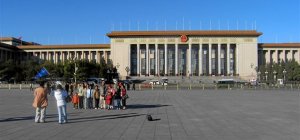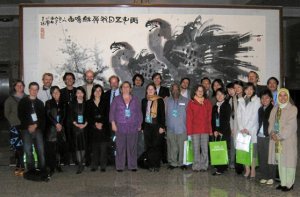

More about CURES
How
it started…
The Johannesburg World Summit for Sustainable Development 2002
(WSSD) failed to develop a global action plan to halt climate change
and climate negotiations had also run into difficulties. Many initiatives
resulted out of this failure, including the German government’s
invitation to host the renewables2004 conference. The Heinrich
Boell Foundation, the German
NGO Forum Environment & Development and the WWF took action and organized
an NGO workshop in Bad Honnef, Germany, in October 2003. The focus
was on preparing for the WSSD follow up conference - Renewables
2004 in Bonn. In order to bundle their proposals and to strengthen
their position, NGOs from all over the world formed a new network:
"Citizens United for Renewable Energies and Sustainability":
C U R E S.
CURES calls for ambitious programs to promote
renewable energies because:
- Urgent measures to progress away from the current fossil energy
system are required to stop rapid global warming.
- renewable energies are the only way to give access to modern
energy services to the two billion people currently excluded from
them.
- While most developing countries so far depend on imported fossil
fuels, renewable energies open up the opportunity for decentralised
energy supply, which are produced locally, creating more employment,
- renewable energy systems are far less prone to corruption and
crises than the fossil energy system.
In preparation for renewables 2004, the CURES-NGOs agreed
to develop common strategies and demands for this conference and
therefore drew up a declaration: "The Future
is Renewable", which at that point was signed by 38
organisations. The declaration calls for avoiding dangerous climate
change and for the implementation of the Millennium Development
Goals. It calls on all governments not to allow themselves to be
blocked any longer by obstructive governments and lists many policies
and measures, such as the phasing out of subsidies for fossil and
nuclear energies and effective steps and frameworks for renewable
energies. International financial institutions, such as the world bank, are prompted
to radically restructure their energy projects. The business sector
is also called upon to come up with new programs. The declaration
was sent out to almost all governments worldwide before renewables
2004, having already signed by 120 organisations.
Writing the declaration was only a first step
of the newly-formed CURES-network. The even bigger task was to coordinate
the contributions of the international NGO-community into the preparatory
process of renewables 2004. By the time the conference started on
1 June, more than 220 organisations had endorsed the declaration.
 The
renewables 2004-conference The
renewables 2004-conference
The 4-day-conference in Bonn did not focus on long discussions
of texts but on presentations of good-practice and the exchange
of experiences. Although it wasn’t one of the celebrated UN climate
conferences, many of the nearly 3000 participants compared renewables
2004 with them. Indeed it could become a milestone for a creative
development in international policies, leading the way out of the
UN consensus trap. However, in the run up to the conference there
were some backlashes such as the European commission’s failure to
set a renewables target for 2020 for the enlarged EU. Further, at
the conference itself there were fierce controversies about the
role of large hydro power.
However the strong presence of developing countries during the conference
was remarkable. Countries like China, the Philippines, Egypt and
Algeria included national targets for renewable energies in the
international action plan thereby showing leadership
to other developing countries. Germany declared its intention to
give another 500 Million Euro for renewable energy projects in developing
countries. These commitments have led to Bonn renewables2004 being
described as a success, even though very few governments committed
to replacing fossil and nuclear energy with renewables.
During the Conference, daily meetings for all CURES members were
held and the most relevant issues discussed. On some there where
wide variations between the view of representatives from northern
and southern countries. For example Mali had - contrary to Germany-
no need to discuss an energy law to introduce RE onto the power
market since its power market is already renewable energies based.
So exchanges about different perspectives were very enlightening.
These exchanges also resulted in north-south-cooperation for access
to renewable energy –in recognition that there is no better way
of uniting environmental issues and development. This is one of
the many reasons that at the last CURES meeting all participants
agreed that CURES must continue. A group of 20 coordinators was
formed, according to the regions, important networks and expertise:
The CURES Coordination
 The Beijing International Renewable Energy Conference (BIREC 2005)
The Beijing International Renewable Energy Conference (BIREC 2005)
 The
Beijing International Renewable Energy Conference (BIREC 2005) ended
on Nov 8 with results that were considered highly satisfactory by
the participating NGOs. Although this follow-up conference to the
Bonn Renewables 2004 was not intended to be a conference for new
commitments, host country China was making significant announcements.
It raised its target for wind energy capacity by 2020 from 20 GW
to 30 GW.The conference sends a strong
message that renewable energies are now a relevant alternative to
conventional energies, also for developing and newly industrializing
nations. The
Beijing International Renewable Energy Conference (BIREC 2005) ended
on Nov 8 with results that were considered highly satisfactory by
the participating NGOs. Although this follow-up conference to the
Bonn Renewables 2004 was not intended to be a conference for new
commitments, host country China was making significant announcements.
It raised its target for wind energy capacity by 2020 from 20 GW
to 30 GW.The conference sends a strong
message that renewable energies are now a relevant alternative to
conventional energies, also for developing and newly industrializing
nations.
The negotiations on the conference
declaration  ended with results that were cautiously welcomed by the NGOs. Please
read a more detailed analysis by Steve Sawyer (Greenpeace) here.
ended with results that were cautiously welcomed by the NGOs. Please
read a more detailed analysis by Steve Sawyer (Greenpeace) here.
 NGOs
have been quite active in this international conference. On Nov
6, an International Civil Society Workshop organized by CANGO
(China) and ISEP
(Japan) and supported by the Heinrich-Böll-Foundation
informed 87 Chinese and international participants about the benefits
of renewable energies and allowed for the exchange of experiences
(programme
and presentations). The workshop elaborated a Civil
Society declaration NGOs
have been quite active in this international conference. On Nov
6, an International Civil Society Workshop organized by CANGO
(China) and ISEP
(Japan) and supported by the Heinrich-Böll-Foundation
informed 87 Chinese and international participants about the benefits
of renewable energies and allowed for the exchange of experiences
(programme
and presentations). The workshop elaborated a Civil
Society declaration  .
NGOs were allowed to distribute the declaration in the conference,
and the organizers promised to put it on the BIREC
website. NGOs also intervened several time in plenary discussions. .
NGOs were allowed to distribute the declaration in the conference,
and the organizers promised to put it on the BIREC
website. NGOs also intervened several time in plenary discussions.
The same day a new report „Wind
Force 12 in China“  produced by the Chinese
Renewable Energy Industry Association and sponsored by Greenpeace
and EWEA was released.
It details wind energy potentials in China and shows that the country
has the potential to become a world leader on wind energy (further
information: Greenpeace,
Surewind).
produced by the Chinese
Renewable Energy Industry Association and sponsored by Greenpeace
and EWEA was released.
It details wind energy potentials in China and shows that the country
has the potential to become a world leader on wind energy (further
information: Greenpeace,
Surewind).
Quite signifantly, WWF
China and GTZ
organised with the support of the Heinrich-Böll-Foundation
on Nov 7 a Forum on South-South-Cooperation in the Great Hall of
the People which was included as part of the official conference
programme.
Press releases of NGOs on the Conference:
 Renewable
Solutions - an NGO conference on renewable energy and climate change
(1./2. Dec. 2005) Renewable
Solutions - an NGO conference on renewable energy and climate change
(1./2. Dec. 2005)
Close to 100 NGO participants from over 40 countries were involved
at the Renewable Solutions Conference during the international
climate change negotiations of COP 11/MOP 1 (11th Meeting
of the Parties to the United National Framework Convention on Climate
Change/First Meeting of the Parties to the Kyoto Protocol)
in Montreal in December 2005.
The goal of the two-day conference was to create strategies and
proposals to promote the global transition to renewable energy and
to develop practical recommendations on the future of the Clean
Development Mechanism (CDM) - in meeting climate change and development
needs.
In the run-up to the conference an options
paper  was prepared by the Canadian Renewable Energy Alliance (CanREA)
focussing on
was prepared by the Canadian Renewable Energy Alliance (CanREA)
focussing on
- national and international targets and timelines for renewable
energy and sustainable development,
- technology transfer and capacity development,
- innovative financing mechanisms and the establishment of fair
and equitable renewable energy markets.
These issues as well as key recommendations were discussed on the
first conference day in parallel workshops and were compiled as
strategic
recommendations  on moving forward the global transition to renewable energy. For
further detail see also here
on moving forward the global transition to renewable energy. For
further detail see also here
 . .
The conference's general and strong conclusion is that in order
to prevent dangerous climate changes and meet Kyoto targets the
maximization of renewable energy and energy efficiency to their
full potential is essential. The implementation of these aims is
seen in long-term predictable political and legal frameworks and
has to be carried out by the issues discussed, especially by the
setting of binding national targets, by adequate financing mechanisms
as well as a better technology transfer and enhanced international
co-operations.
Subject of the second
conference day was the definition of a shared vision between
175 representatives of environmental and development NGOs on the
future of the CDM. The conclusions
paper  of this conference day draw a quite negative balance of the effects
of the CDM for local sustainable energy and development as well
as poverty reduction and stresses the need of developing a new and
more sustainable financial mechanism.
of this conference day draw a quite negative balance of the effects
of the CDM for local sustainable energy and development as well
as poverty reduction and stresses the need of developing a new and
more sustainable financial mechanism.
 UNECE
Regional Implementation Meeting (RIM) UNECE
Regional Implementation Meeting (RIM)
The second
UNECE (The United Nations Economic Commission for Europe) Regional
Implementation Meeting (RIM), took place in Geneva, 15.-16.
December, in preparation of the 14th
session of the UN Commission on Sustainable Development (CSD)
in May 2006 in New York.
The regional implementation meetings provide regional inputs for
the work of the Commission which is organized in two-year
implementation cycles. The actual implementation cycle focuses
on energy for sustainable development, industrial development, air
pollution/atmosphere and climate change.
The UNECE secretariat summarized the relevant issues in a background
document  .
The outcome of the conference you can find in the Chair's
summary .
The outcome of the conference you can find in the Chair's
summary  . .
The NGOs
speech at UNECE RIM  severe criticised the UNECE background paper for its uncritical
position on nuclear energy and distinctly called for more concrete
arrangements for sustainable energy production and consumption.
severe criticised the UNECE background paper for its uncritical
position on nuclear energy and distinctly called for more concrete
arrangements for sustainable energy production and consumption.
According to the invitation of the CSD all regional commissions
organized regional
implementation meetings in preparation of CSD 14. You can find
NGO reports of the Latin America and the Caribbean Regional Implementation
Meeting as well as from the RIM of Asia and the Pacific at the e-newsletter
February 2006 of unedoforum
 . .
 CURES
Objectives CURES
Objectives
CURES intends…
- to bring initiatives, projects, processes and non governmental
organisations all over the world together, thereby respecting
their diverse needs and conditions
i.e. working on the perception and representation of CURES as
an independent network, to facilitate local initiatives and include
their experiences when formulating strategies and common policies.
- to serve as an information network
i.e. exchange experiences and knowledge between all members of
the network.
- to shape policies and processes
i.e. define sustainable financing for RE, influence the follow-up
process of renewables 2004, confirm the recognition that RE are
only acceptable when used in a sustainable way (hydro power, biomass,
etc).
- to monitor and evaluate policies, processes, governments and
international financial institutions
i.e. hold governments and international financing institutions
accountable to the actions they committed to in the International Action Plan (IAP). Analyse projects on
a regional basis, thereby identifying the ones that really transfer
resources and are additional. Evaluate the IAP programmes on sustainability.
Monitor the 2010-EU-targets.
The new coordinators-team formed immediately after renewables2004
is working on implementing on these tasks.
By
now, CURES consists of more than 240 organisations
and continues to grow. The process is still open for all NGOs worldwide
to sign the CURES declaration (sign-on@forumue.de) and to take part
in the discussion of how to increase the role of renewable energies
worldwide.

|

















 The
Beijing International Renewable Energy Conference (BIREC 2005) ended
on Nov 8 with results that were considered highly satisfactory by
the participating NGOs. Although this follow-up conference to the
Bonn Renewables 2004 was not intended to be a conference for new
commitments, host country China was making significant announcements.
It raised its target for wind energy capacity by 2020 from 20 GW
to 30 GW.The conference sends a strong
message that renewable energies are now a relevant alternative to
conventional energies, also for developing and newly industrializing
nations.
The
Beijing International Renewable Energy Conference (BIREC 2005) ended
on Nov 8 with results that were considered highly satisfactory by
the participating NGOs. Although this follow-up conference to the
Bonn Renewables 2004 was not intended to be a conference for new
commitments, host country China was making significant announcements.
It raised its target for wind energy capacity by 2020 from 20 GW
to 30 GW.The conference sends a strong
message that renewable energies are now a relevant alternative to
conventional energies, also for developing and newly industrializing
nations.